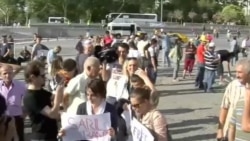ISTANBUL —
Three weeks after violent clashes between protestors and the Turkish government, calm has been restored. But peaceful protests continue and many people wonder how the confrontation will end.
Taksim Squarel, the scene of violent protests, has returned to normal, although Turkish police now occupy nearby Gezi Park, whose proposed demolition sparked the clashes. And they keep a close watch on the square where protesters maintain a silent standing vigil.
The confrontation began as an environmental protest. But it broadened after police used what people felt was excessive force against the activists. Opposition parties, revolutionary movements and fringe groups quickly joined in.
Security guard Sati Ay says he was appalled by the police violence and what he says were inflammatory remarks by Prime Minister Recep Tayyip Erdogan.
“I think he [Erdogan] should leave, and a new government should be formed that listens and supports the people. He should stop calling protesters looters and stop turning people against each other,” he said.
Sevilay, a teacher who gives only her first name, says the government's authoritarian response fueled the protests.
“I think it's wrong to judge things from a political perspective. We are not under any political party's flag here. We all have some problems and want to be heard. We want equality, justice and law,” Sevilay said.
Erdogan remains popular in places like this working-class neighborhood in Old Istanbul called Eyup. Retiree Ahmet Arda says the crackdown was necessary because the protests had become violent.
“I think what the government did was right. I am 50 years old. I have never seen such horrible things that those protestors did,” Arda said.
Many people like Erdogan's Islamist credentials. Even more back him because of the economic prosperity during his 11 year-rule. Restaurant worker Mehmet Bosal, says Erdogan was democratically elected.
“This has nothing to do with democracy. The people chose Erdogan and his government. It was the people's decision," Bosal said.
Bogazici Universtiy Professor Karay Caliskan says the country is divided.
“The supporters of Erdogan are doubtful of his leadership potential. The supporters of the opposition parties are there, but they don't know whether they are going to grow. Now there's an accordion of undecided, around 20 percent, and they are going to decide what's going to happen,” Caliskan said.
At Taksim Square Nunay Toper and her friend, Oguzcan Bozkurt, say they will maintain their vigil.
“I think the protests will continue. As long as nothing changes, we will be here,” Toper said.
As a result, many people believe the protest will only end with the elections due in the next year.
Taksim Squarel, the scene of violent protests, has returned to normal, although Turkish police now occupy nearby Gezi Park, whose proposed demolition sparked the clashes. And they keep a close watch on the square where protesters maintain a silent standing vigil.
The confrontation began as an environmental protest. But it broadened after police used what people felt was excessive force against the activists. Opposition parties, revolutionary movements and fringe groups quickly joined in.
Security guard Sati Ay says he was appalled by the police violence and what he says were inflammatory remarks by Prime Minister Recep Tayyip Erdogan.
“I think he [Erdogan] should leave, and a new government should be formed that listens and supports the people. He should stop calling protesters looters and stop turning people against each other,” he said.
Sevilay, a teacher who gives only her first name, says the government's authoritarian response fueled the protests.
“I think it's wrong to judge things from a political perspective. We are not under any political party's flag here. We all have some problems and want to be heard. We want equality, justice and law,” Sevilay said.
Erdogan remains popular in places like this working-class neighborhood in Old Istanbul called Eyup. Retiree Ahmet Arda says the crackdown was necessary because the protests had become violent.
“I think what the government did was right. I am 50 years old. I have never seen such horrible things that those protestors did,” Arda said.
Many people like Erdogan's Islamist credentials. Even more back him because of the economic prosperity during his 11 year-rule. Restaurant worker Mehmet Bosal, says Erdogan was democratically elected.
“This has nothing to do with democracy. The people chose Erdogan and his government. It was the people's decision," Bosal said.
Bogazici Universtiy Professor Karay Caliskan says the country is divided.
“The supporters of Erdogan are doubtful of his leadership potential. The supporters of the opposition parties are there, but they don't know whether they are going to grow. Now there's an accordion of undecided, around 20 percent, and they are going to decide what's going to happen,” Caliskan said.
At Taksim Square Nunay Toper and her friend, Oguzcan Bozkurt, say they will maintain their vigil.
“I think the protests will continue. As long as nothing changes, we will be here,” Toper said.
As a result, many people believe the protest will only end with the elections due in the next year.





